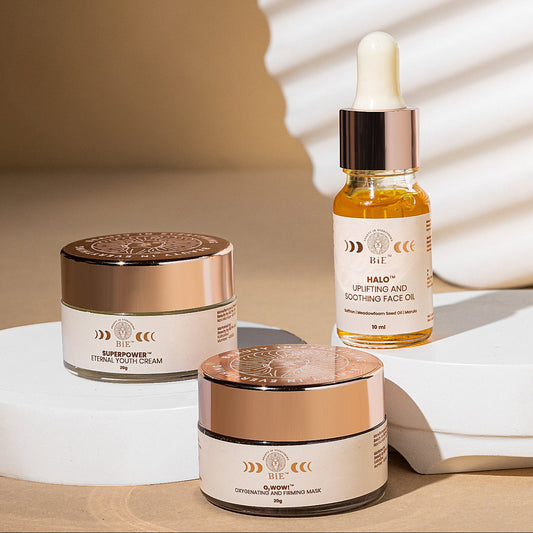DIY Acne Treatments: Home Remedies That Actually Work

Highlights
Highlights

Acne is a common skin problem that affects people of all ages. While there are many over-the-counter and prescription acne treatments available, some people prefer to use natural remedies to avoid the potential side effects of these medications. Fortunately, there are several effective DIY acne treatments that can be made from ingredients found in most kitchens. These include tea tree oil, honey, aloe vera, apple cider vinegar, and green tea. Tea tree oil has antibacterial properties and can help reduce inflammation, while honey is a natural antibacterial agent that can help soothe the skin. Aloe vera can also soothe the skin and reduce inflammation, while apple cider vinegar can help balance the skin's pH levels. Green tea contains antioxidants that can help reduce inflammation and redness. Overall, DIY acne treatments can be a safe and effective way to manage acne and improve the appearance of the skin.
Tea tree oil
Tea tree oil is a naturally occurring essential oil with antibacterial and anti-inflammatory qualities, making it an excellent acne therapy. Terpenes, which are chemical molecules that have been proven to fight germs and fungi, are found in the oil. Tea tree oil, when applied to the skin, can aid to decrease acne-related irritation and redness, as well as limit the growth of acne-causing bacteria. Tea tree oil can also aid in the unclogging of pores and the removal of excess oil from the skin, both of which are factors in the development of acne. It is a natural antiseptic and has been shown to be effective in treating acne. Tea tree oil is quite strong and, if applied undiluted, can cause skin irritation. Before applying it to the skin, combine a few drops of tea tree oil with a carrier oil, such as coconut oil or jojoba oil. Begin by gently cleaning your skin to remove debris, oil, and makeup. Apply the diluted tea tree oil straight to the afflicted region using a cotton swab. Avoid using too much oil, since this can cause skin irritation. Allow the tea tree oil to sit on your skin for around 15-20 minutes. If you have sensitive skin, you should start with a shorter duration. Rinse your skin with warm water and wipe dry with a clean towel after 15-20 minutes. To help soothe and hydrate your skin, apply a mild moisturizer.
Honey
Honey is a natural anti-inflammatory and antibacterial agent that can help to decrease acne-related inflammation, redness, and edema. Honey includes antioxidants that can help protect the skin from free radical damage, which is a damaging chemical that can contribute to the development of acne.Honey also has antibacterial characteristics that can aid in the killing of acne-causing germs. It includes naturally occurring hydrogen peroxide, which has antimicrobial qualities. Furthermore, honey has a low pH, making it harder for germs to thrive. Raw, organic honey is preferred for this therapy since it contains more antibacterial qualities than processed honey. Honey may be used as a spot treatment for acne or applied to the full face for more general therapy. Begin by gently cleaning your skin to remove debris, oil, and makeup. Apply a thin coating of raw, organic honey to the afflicted region using a clean fingertip or cotton swab. Make certain that you cover the entire region. Allow the honey to sit on your skin for 10-15 minutes. For a more intense treatment, keep it on overnight. Rinse your skin with warm water and wipe dry with a clean towel after 10-15 minutes.
Aloe vera
Aloe vera has a number of bioactive substances, including vitamins, minerals, and amino acids, that can aid to soothe and heal the skin. Aloe vera may also aid in moisturising the skin, which is crucial for reducing dryness and irritation, both of which can contribute to acne formation. It can also aid in the unclogging of pores and the removal of excess oil from the skin, both of which contribute to the development of acne. Aloe vera has been demonstrated to have antimicrobial characteristics that can aid in the killing of acne-causing bacteria. Aloe vera contains anti-inflammatory and antibacterial characteristics that can aid in the treatment of acne. Cut a tiny piece of aloe vera from a fresh plant, or use 100% pure aloe vera gel from the shop. Begin by gently cleaning your skin to remove debris, oil, and makeup. Apply a small coating of aloe vera gel to the afflicted region using a clean fingertip or cotton swab. Make certain that you cover the entire region. Allow the aloe vera gel to sit on your skin for around 10-15 minutes. For a more intense treatment, keep it on overnight. Rinse your skin with warm water and wipe dry with a clean towel after 10-15 minutes. To help soothe and protect your skin, apply a mild moisturizer.
Apple cider vinegar
Apple cider vinegar is a natural astringent that can help eliminate excess oil from the face and unclog pores, both of which contribute to acne formation. It includes acetic acid, which has been proven to have antibacterial qualities that can aid in the killing of acne-causing bacteria. Apple cider vinegar contains alpha hydroxy acids (AHAs), which are natural exfoliants that can help exfoliate dead skin cells and enhance skin texture and appearance. AHAs can also aid in the reduction of acne scars and hyperpigmentation. Apple cider vinegar contains natural acids that assist to regulate your skin's pH and minimize acne-related irritation. In a basin or container, combine equal parts apple cider vinegar and water. Begin by gently cleaning your skin to remove debris, oil, and makeup. Apply the apple cider vinegar and water combination to the afflicted region using a cotton ball or pad. Allow the mixture to sit on your skin for 10-15 minutes. Rinse your skin with cool water and wipe dry with a clean towel after 10-15 minutes.
Turmeric
Turmeric is a natural anti-inflammatory and antioxidant that can help decrease acne-related inflammation, redness, and edema. It includes a component called curcumin, which has been proven to have antibacterial characteristics that can aid in the killing of acne-causing bacteria.Turmeric can also aid in the regulation of sebum production, which is the oil that contributes to the development of acne. Turmeric can help to unclog pores and eliminate excess oil from the skin when applied as a face mask or spot treatment. Make a thick paste with 1-2 tablespoons of turmeric powder and enough water or honey. Begin by gently cleaning your skin to remove debris, oil, and makeup. Apply the turmeric paste to the afflicted region with a clean fingertip or cotton swab. Make certain that you cover the entire region. Allow the turmeric paste to sit on your skin for around 10-15 minutes. Rinse your skin with warm water and wipe dry with a clean towel after 10-15 minutes. Furthermore, some people may be allergic to turmeric, so perform a patch test before applying it to your full face.


